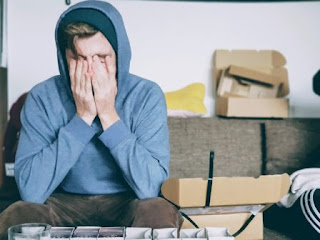window.dataLayer = window.dataLayer || []; function gtag(){dataLayer.push(arguments);} gtag(‘js’, new Date()); gtag(‘config’, ‘UA-174026853-1’);
Insomnia is no stranger to the world. According to the Sleep Foundation 30% of the population suffer from sleep disorders. This is one of the many reasons some people wake up feeling unrested the next day. If we’re not able to get a good night’s rest, it puts our immune system in a vulnerable state.
 |
| Photo credit: Unsplash |
Sleep disorder types
· Insomnia (can’t sleep for the whole night)
· Sleep apnea (not breathing properly while asleep)
· Parasomnias (causes movement and behaviour whilst asleep)
While there are various types of sleep disorders but today’s post will focus on insomnia. Here are some of its symptoms:
- Struggling to fall asleep
- Are unable to fall asleep and stay asleep for the duration of the night
- Waking up early and cannot fall back asleep
- After waking up the next day you don’t feel rested
- Inability to focus during the day
- These can continue for several days in a week and can carry on unless it is treated.
Why do people experience insomnia?
There are various reasons people suffer from insomnia and it’s frequently related to their lifestyle.
Depression
Most people dealing with depression will agree that getting a good night’s rest is virtually impossible. It can deprive you of sleep leaving you feeling even more exhausted.
Stress
 |
| Photo credit: Unsplash |
Work and aspects of our personal lives can put us under immense pressure. As a result this could lead to a lack of sleep because just like in the case of depression. The chemicals in the brain thus changes and this could lead to emotional outbursts and irrational behaviour.
NB: Stress along with depression is bad because one acts as a catalyst for the other causing the body to increase stress hormones, elevating feelings of anxiety and depression. This would need to be managed as soon as possible because it can be detrimental in the long run for your overall mental well-being and health.
Anxiety
Similar to leading a stressful life, anxiety and anxious feelings and worry can stimulate stress hormones leading to the reduced ability to sleep. Life can bring many challenges and it’s normal to feel anxious now and again, but being anxious all the time is no good.
Medication
 |
| Photo credit: Unsplash |
All medications have side effects and some can cause sleep deprivation. This is common with certain antidepressants, contraceptives, high blood pressure beta blockers, diet pills, and ADHD (Attention Deficit Hyperactivity Disorder) pills to name a few.
Age
Oftentimes, older people struggle with sleep and insomnia is one of the most frequented sleep disorder amongst the middle-aged and senior generation.
Learn to manage insomnia and get better sleep
Invest in vitamin D
The body can naturally produce a certain amount of vitamin D when exposed to the sun. Receiving enough sunlight in the morning can help with that. Getting sun in the cooler hours of the morning will minimise UV damage, but will help your body adjust to the sun’s goodness.
Read before bed or do something to distract your mind
Sometimes when you can’t get sleep, your mind may be working “overtime.” This leads to more anxiety and thus the inability to sleep. Reading could help your brain to wind down as the eyes move to and fro.
When keeping yourself preoccupied before bed, make sure that you’re not doing something that overexerts your body? The lights shouldn’t be bright and you should refrain from screens emitting “blue light” right before bedtime. Not only does the blue light contribute to eye strain, but it also tricks the brain into thinking that it’s daytime leaving you alert and awake.
Have a morning exercise routine
 |
| Photo credit: Unsplash |
Exercising in the morning isn’t everyone’s cup of tea and I get that. But, light stretches and low impact exercise can help your body get into a better sleep routine.
Practice good sleep hygiene
Sleep hygiene is very important for a healthy rest at night time. This includes cutting out late heavy suppers, sweet treats and drinks right before bed. You can also improve your sleep by limiting your naps during the day.
Eat a balanced diet
It’s amazing how what we eat can have an effect on our health. Eating healthy will help your body perform better and that along with exercise is an excellent combination for better wellness.
There are certain foods that can help improve your sleep because it helps to boost melatonin the sleep hormone. These foods are also packed with antioxidants and other nourishing nutrients:
- Almonds
- Kiwi
- Fatty fish
- Milk
- Bananas
- Chamomile tea
- Honey
Stop looking at the time
It’s normal to want to look at the time if you’ve woken up in the middle of the night, but looking at the clock will make you feel more anxious.
Change your lifestyle
- Breathe
- Yoga
- Meditation
Add a relaxing breathing exercise into your day. Taking deeper breathes can help reduce stress hormones such as cortisol.
Another form of relaxation and healing for your mental wellness and body comes in the form of meditation. The benefits of meditation are plentiful and worth every moment. It can help reduce stress and depression. Meditation not only helps you to relax, but also helps you become more mindful and instils a sense of awareness.
With regular breathing exercise, yoga and meditation, you could find yourself enjoying a better night’s sleep more regularly.
Conclusion
If you’re battling insomnia, know that you’re not alone. It’s great to know that there are so many natural ways to help cope with this sleeping disorder.
Natural healing doesn’t pose the risks of medication and thus it is good for your well-being. However, don’t stop taking any of your medication without your doctor authorising it.
Are you getting a good night’s sleep every night?